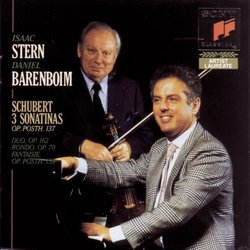| All Artists: Franz [Vienna] Schubert, Daniel Barenboim Title: Schubert: 3 Sonatinas (Sonatas), Op. Posth. 137; Sonata (Duo), Op. 162; Fantasie, Op. Posth. 159; Rondo (Rondeau Brilliant), Op. 70 Members Wishing: 0 Total Copies: 0 Label: Sony Release Date: 3/30/1990 Genre: Classical Styles: Chamber Music, Instruments, Strings Number of Discs: 2 SwapaCD Credits: 2 UPC: 074644450422 |
Search - Franz [Vienna] Schubert, Daniel Barenboim :: Schubert: 3 Sonatinas (Sonatas), Op. Posth. 137; Sonata (Duo), Op. 162; Fantasie, Op. Posth. 159; Rondo (Rondeau Brilliant), Op. 70
 | Franz [Vienna] Schubert, Daniel Barenboim Schubert: 3 Sonatinas (Sonatas), Op. Posth. 137; Sonata (Duo), Op. 162; Fantasie, Op. Posth. 159; Rondo (Rondeau Brilliant), Op. 70 Genre: Classical
|
Larger Image |
CD Details |
CD ReviewsEnthusiastic, Highly Characteristic and Inspiring! Raymond Vacchino | Toronto, ON. Canada | 03/09/2008 (5 out of 5 stars) "As one would expect Daniel Barenboim and Isaac Stern as a team truly make music that is distinctive, warmly expressed and filled with harmonic flavor. The three Sonatinas, Op.137 in D, A minor, G minor and the Sonata Op.162 in A, are inspiring and charming. The playing offers brilliance, attention to musical priorities of the period and the interpretative details keep the performance notable with a sensitively judged dynamic scheme. They are not considered very important works and boast little of the real Schubert, but make it up in part by offering some presentable Beethoven and generous portions of Mozart. For example, the first sonata (in D) opens with a theme which sounds curiously like a major version of the first theme of Mozart's E Minor Sonata for Violin and Piano (K.304). Despite these observations, Barenboim and Stern press on keeping the writing vividly within the framework. The word brilliant, in a title of Schubert's period, usually prepares one for pure trash. But the Rondo brilliant, Op.70, is far from trash in this recording. Composed in 1826, the year of the last two quartets, it is stronger, superior music than the violin sonatas, and even offers a few gleams of the "real" Schubert, like the second part of the main theme, and the last subject, with its grace and charm. Barenboim and Stern launch the principal subject as a tiny liaison motive. They maintain the rhythmic elan of the whole Rondo with an assertive, infectious effect. Though the Fantasy for Violin and Piano was written as a show piece for a Czech virtuoso, it has pages of much higher quality than any of the foregoing duets. Barenboim and Stern convey the Andante molto beautifully, even though demanding too much of the piano in the way of string tremolos Barenboim's facility allows him to pass them by without concern. Overall, this recording offers playing that is tonally sweet, passionate and filled with finesse. When necessary this finely matched team provides even more assertiveness and thrilling effects without forcing tone color or disturbing the textures.
Author: Raymond Vacchino M.Mus. A.Mus. L.R.S.M. Licentiate (honorary)" |

 Track Listings (11) - Disc #1
Track Listings (11) - Disc #1